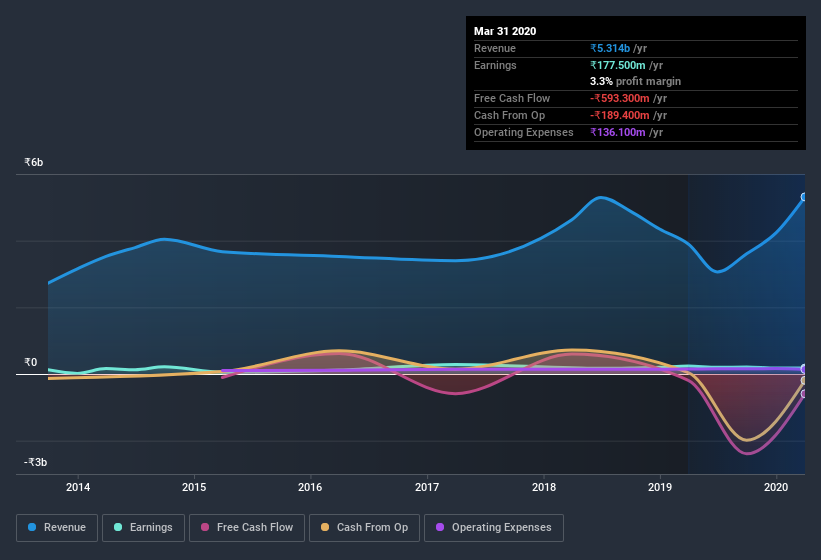Should You Use K.M. Sugar Mills's (NSE:KMSUGAR) Statutory Earnings To Analyse It?

As a general rule, we think profitable companies are less risky than companies that lose money. However, sometimes companies receive a one-off boost (or reduction) to their profit, and it's not always clear whether statutory profits are a good guide, going forward. In this article, we'll look at how useful this year's statutory profit is, when analysing K.M. Sugar Mills (NSE:KMSUGAR).
While K.M. Sugar Mills was able to generate revenue of ₹5.31b in the last twelve months, we think its profit result of ₹177.5m was more important. The chart below shows how it has grown revenue over the last three years, but that profit has declined.
Check out our latest analysis for K.M. Sugar Mills

Importantly, statutory profits are not always the best tool for understanding a company's true earnings power, so it's well worth examining profits in a little more detail. Today, we'll discuss K.M. Sugar Mills's free cashflow relative to its earnings, and consider what that tells us about the company. Note: we always recommend investors check balance sheet strength. Click here to be taken to our balance sheet analysis of K.M. Sugar Mills.
Examining Cashflow Against K.M. Sugar Mills's Earnings
As finance nerds would already know, the accrual ratio from cashflow is a key measure for assessing how well a company's free cash flow (FCF) matches its profit. To get the accrual ratio we first subtract FCF from profit for a period, and then divide that number by the average operating assets for the period. This ratio tells us how much of a company's profit is not backed by free cashflow.
Therefore, it's actually considered a good thing when a company has a negative accrual ratio, but a bad thing if its accrual ratio is positive. While having an accrual ratio above zero is of little concern, we do think it's worth noting when a company has a relatively high accrual ratio. That's because some academic studies have suggested that high accruals ratios tend to lead to lower profit or less profit growth.
For the year to March 2020, K.M. Sugar Mills had an accrual ratio of 0.25. Unfortunately, that means its free cash flow fell significantly short of its reported profits. Over the last year it actually had negative free cash flow of ₹593m, in contrast to the aforementioned profit of ₹177.5m. We also note that K.M. Sugar Mills's free cash flow was actually negative last year as well, so we could understand if shareholders were bothered by its outflow of ₹593m.
Our Take On K.M. Sugar Mills's Profit Performance
K.M. Sugar Mills's accrual ratio for the last twelve months signifies cash conversion is less than ideal, which is a negative when it comes to our view of its earnings. Therefore, it seems possible to us that K.M. Sugar Mills's true underlying earnings power is actually less than its statutory profit. Sadly, its EPS was down over the last twelve months. Of course, we've only just scratched the surface when it comes to analysing its earnings; one could also consider margins, forecast growth, and return on investment, among other factors. So if you'd like to dive deeper into this stock, it's crucial to consider any risks it's facing. Our analysis shows 5 warning signs for K.M. Sugar Mills (2 don't sit too well with us!) and we strongly recommend you look at them before investing.
This note has only looked at a single factor that sheds light on the nature of K.M. Sugar Mills's profit. But there are plenty of other ways to inform your opinion of a company. Some people consider a high return on equity to be a good sign of a quality business. While it might take a little research on your behalf, you may find this free collection of companies boasting high return on equity, or this list of stocks that insiders are buying to be useful.
When trading K.M. Sugar Mills or any other investment, use the platform considered by many to be the Professional's Gateway to the Worlds Market, Interactive Brokers. You get the lowest-cost* trading on stocks, options, futures, forex, bonds and funds worldwide from a single integrated account.Promoted
Valuation is complex, but we're here to simplify it.
Discover if K.M. Sugar Mills might be undervalued or overvalued with our detailed analysis, featuring fair value estimates, potential risks, dividends, insider trades, and its financial condition.
Access Free AnalysisThis article by Simply Wall St is general in nature. It does not constitute a recommendation to buy or sell any stock, and does not take account of your objectives, or your financial situation. We aim to bring you long-term focused analysis driven by fundamental data. Note that our analysis may not factor in the latest price-sensitive company announcements or qualitative material. Simply Wall St has no position in any stocks mentioned.
*Interactive Brokers Rated Lowest Cost Broker by StockBrokers.com Annual Online Review 2020
Have feedback on this article? Concerned about the content? Get in touch with us directly. Alternatively, email editorial-team@simplywallst.com.
About NSEI:KMSUGAR
K.M. Sugar Mills
Manufactures and sells sugar and industrial alcohol in India.
Adequate balance sheet and slightly overvalued.

